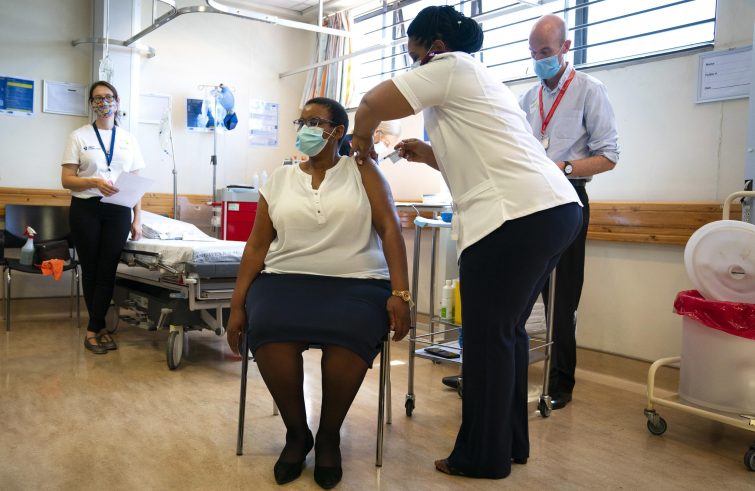
Coronavirus vaccine distribution in Africa is slow and hampered by a lack of supplies, with concerns for the timing of the second doses. Africa’s COVID-19 cases hit a 4.8 million mark with 130,000 confirmed deaths. But only 31 million people were vaccinated with the first dose out of a total population of 1.4 billion. Vaccine rollout stalled in the first stage: only 7 million Africans were administered a second dose.
Morocco tops the list of African countries that administered the highest number of vaccines with 10 million doses, but with concerning delays between the first and second dose. Nigeria (more than 964,000), Ghana (almost 600,000) and Kenya (340,000) come next, according to AMREF data. However, these are negligible figures compared to national populations. The problem remains: Africa is short of 1.5 billion doses of the vaccine. According to the WHO, Africa needs at least 20 million doses of AstraZeneca’s COVID-19 vaccine to complete the vaccination process.
After India’s Serum Institute ( under Covax) was forced to halt shipments of AstraZeneca to meet domestic demand, Africa’s vaccine rollout has hit a dead end. In fact, Kenya and Ghana extended the interval period between the first and second shots from 8 to 12 weeks to buy time while waiting for more doses of the vaccine.
The situation in South Africa. The African continent risks going back to square one. The first deliveries of the vaccines began last March through Covax -a mechanism for equitable distribution of COVID-19 vaccines – but the program is progressing at a slow pace, favouring new waves of infection. “There is now talk of a third wave of the virus here in Johannesburg and also in Durban. Cases have increased threefold in the last month”, Father Efrem Tresoldi, a Comboni missionary, reported over the phone from South Africa. All South Africa moved back to Alert level 2 after having passed to level 1.”
The virus has changed to a new more severe variant in South Africa, where about 57,000 people were killed by COVID-19 – a figure that is actually threefold higher.
South African and Indian variants are the most unpredictable. “We are again living in fear, knowing that the situation is bound to get worse since winter has just begun,” Fr Tresoldi pointed out. “In townships, people have hardly any living space, their houses are too small to ensure physical distancing.”
Senegal’s exception. By contrast, Senegal is surprisingly among the African Countries with the most developed vaccination systems (but it is a veritable exception). This applies also to its capacity to manufacture its own vaccine. Dakar has made an agreement with Belgian biotech group Univercellsas to produce its own COVID-19 vaccine starting next year. “ “The vaccination program in Senegal is proceeding at a good pace,” said Sister Grazia Anna Morelli, member of the Society of Mary. “We are being administered the first and second doses of China’s SinoFarm vaccine, as well as Astrazeneca. The country has fully reopened, right from the start, but the Church has been much more cautious. We nuns and priests continue to wear masks, and religious services have only just resumed.”
Senegal is also at the forefront in terms of treatment:
“Some 40,000 out of 43,000 cases have been treated with a cocktail of antibiotics and chloroquine,” the nun said. Chloroquine is an antimalarial drug that appears to cure COVID-19 patients with milder illness.
Vaccines and patents. But the biggest unknown in Africa remains the lifting of patent protections. The main obstacle is Europe’s “protection” granted to Big Pharma, confirmed by the Global Health Summit on 21 May. “South Africa is determined to pursue its international lobbying efforts for the lifting of patents on COVID-19 vaccines”, said Father Efrem. “President Ramaphosa has met with Macron, who is in favour of opening intellectual property. Vaccines must be accessible and affordable to all.”
In this respect Johannesburg is fully prepared: South Africa overrode patents on AIDS drugs some 20 years ago,”
when antiretrovirals were not available and the country decided to produce generic drugs, regardless of patents”, Tresoldi recalled. Nowadays, the battle to lift patent protection is rapidly becoming “a battle of civilisation”, the two missionaries remarked. But there is also another unknown factor, and it’s people’s fear of vaccines imported from abroad, which could jeopardise an already precarious situation. As with Ebola in Congo, people fear a “Western conspiracy.”
Madagascar and Tanzania. The Africa Center for Strategic Studies called for “dispelling COVID vaccine myths in Africa”, the first myth being that “there is no COVID.” The latest myth is that it only kills “white people” and that herbal remedies are more effective than medical drugs. In this respect, such myths abound.
Madagascar has chosen the path of alternative treatment:
Madagascar’s President Andry Rajoelina discarded the vaccine option to favour herbal “cures”, which predictably the WHO did not endorse. In Tanzania, after denialist President John Magufuli was killed by COVID-19 last March, the country finally reverted to prevention and treatment.
(*) editorial staff, “Popoli e Missione”









